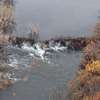
|
Kamishak Bay, Alaska, United States

Elizabeth Earl /
Peninsula Clarion /
April 18, 2017
The prevalence of "weak meats" syndrome in 2014, 2015 meant that somewhere on the order of half of all scallops shucked couldn’t be marketed. That was much higher than the fleet had ever seen before.
Read article
on Peninsula Clarion
|

|
Red Bluff, Popof Island, Alaska

David Osterback /
LEO Network /
September 4, 2016
Fishing for pinks has been really up and down the last few years. In 2014 the catch was really low, and then 2015 it was amazing with more than we had ever seen before. This year's pink salmon return again, was really bad.
Read post on the LEO Network
|

|
Babbage River, Yukon Territory, Canada

Yereth Rosen /
Alaska Dispatch News /
April 19, 2017
Canadian researchers learned that local Inuvialuit hunters had spotted beavers in the region in 2008 and 2009. Those sightings are the first documented signs of North American beaver occupancy on the Beaufort coastal plain.
Read article
on Alaska Dispatch News
|

|
Ferryland, Newfoundland, Canada

Julia Buckley /
INDEPENDENT /
April 19, 2017
Over 600 icebergs have already floated into the North Atlantic this year, compared to an average of 687 over the whole season. Experts believe that this year’s bumper crop is down to strong counter-clockwise winds, as well as global warming.
Read article
on INDEPENDENT
|

|
Yellowknife, Northwest Territories, Canada

Dan Levin, The New York Times /
Alaska Dispatch News /
April 19, 2017
The country's 3,300 miles of ice roads are a lifeline for marooned communities during frigid winters, but climate change is making the roads unsafe much earlier.
Read article
on Alaska Dispatch News
|
The Northern Climate Observer is published by the
Center for Climate and Health. We track news coverage from across the circumpolar north and provide readers with a curated roundup of climate change related events. Thank you for reading our newsletter and for paying attention to our changing world.
Please forward this newsletter or share it on social media. Join the
LEO Network to share your own stories of environmental change.